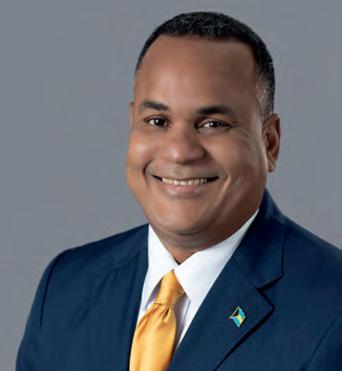
5 minute read
CAPTIVE INSURANCE Exploring the growth in this sector over the past decade
Success story
OVER THE PAST TEN YEARS, THE NUMBER OF LICENSED CAPTIVE INSURANCE ENTITIES REGISTERED IN THE BAHAMAS HAS GROWN CONSIDERABLY
Advertisement
BY CARL CULMER
The growth in The Bahamas’ captive market is largely attributed to small and medium‑sized entities (SMEs) seeking to set up their own segregated accounts. This option has proven to be cost‑effective for those SMEs, especially since they can and do outsource administrative and operational oversight to locally registered insurance managers, financial and corporate service providers and other financial services professionals, such as lawyers and accountants.
WHAT ARE CAPTIVES?
SMEs across various industries are interested in the Bahamian captive market. Their aim is to minimise losses that they might incur during the course of their operations. Such an entity might be either a stand‑alone company, i.e., a single‑parent company, or a registered segregated account in an already licensed segregated account (captive insurance) company. A stand‑alone entity is incorporated, while a segregated account (or cell captive) forms part of a registered segregated accounts company. A typical company considers the size, nature and complexity of its operations before applying for the appropriate category of licence that best fits its strategy and commercial interests.
Presently, all captives are licensed as ‘external insurers’ in accordance with the External Insurance Act, 2009. The Bahamas continues to register captives that insure risk associated with various industries, such as medical and healthcare administration, retail and wholesale distribution, agriculture, construction and real estate. The lines of business extended as coverage within these structures include workers’ compensation benefits, cyber‑risk, directors’ and officers’ insurance and excess liability.
After a spate of growth earlier in the last decade, the aggregate number of segregated accounts has continued to demonstrate gradual growth over the past three years. The chart on page 21 outlines the number of external insurers identified as captives for the period 2019–2021.
STREAMLINED AND ENHANCED
The present legislation has certainly helped the insurance sector to grow to a satisfactory degree, and the Insurance Commission of The Bahamas (the Commission) is determined to keep the applicable law competitive with the laws of other jurisdictions. It also remains intent on keeping its regulatory and supervisory regime effective and in line with the high standards of the International Association of Insurance Supervisors and the Recommendations submitted by the Financial Action Task Force.
In 2021, as part of its strategic plan to amalgamate legislation, the Commission began a review of the jurisdiction’s two principal insurance laws – the Insurance Act, 2005 and the External Insurance Act, 2009. The purpose of the review, which is still in progress, is to streamline regulatory and supervisory requirements and to enhance legislation to help insurance structures. The Commission has collaborated with industry associations, professionals and the general public as part of its consultative effort. Individuals and companies have been keen to use these discussions to find out more about the captive market with a view to establishing captives of their own to support their medium to long‑term risk management strategies.
Despite the lingering effects of the global COVID‑19 pandemic, international companies are still expressing interest in the establishment of captives in The Bahamas. The insurance industry continues to demonstrate its financial resilience to

economic shocks. The effective use of captives can also serve as an additional absorber for companies that have suffered from such global shocks.
GROWTH AND OUTREACH
The Bahamas’ participation in the captive insurance industry dates back to the 1960s. Given the islands’ rich history in this niche industry, the Government of The Bahamas has taken steps in recent years to ensure that this business actively contributes to the overall growth of the financial services sector. Local insurance managers and other financial intermediaries are still finding ways to promote both their own services and the jurisdiction as a whole in the captive market. The Bahamas Financial Services Board (BFSB) has helped them to do so, highlighting the jurisdiction as a competent and competitive international financial centre that promotes synergies between the industries of the financial services sector.

The Commission, along with the BFSB and the country’s captive insurance professionals, participates actively in the captive insurance industry’s events and training seminars. This ensures that all stakeholders remain well acquainted with the industry’s trending topics, challenges and opportunities. The Commission’s partnership with the BFSB has extended the promotional outreach of the jurisdiction as a captive domicile and has provided a forum in which meaningful discussions take place.
THE APPLICATION PROCESS
The BFSB, along with the Commission, will continue to work with the government to target the captive insurance and reinsurance industry as an area of economic interest. Companies that want to base their insurance business in The Bahamas should note the key regulatory requirements for approval.
The external (captive) insurer application process includes the following: ■ a scheduled pre‑application meeting to discuss the proposed business plan; ■ submission of a completed application that includes, but is not limited to, the following:
EXTERNAL INSURERS IN THE BAHAMAS
■ 2019 ■ 2020 ■ 2021
Total captive insurers
Other external insurers (non-captive)
Captive cells (segregated accounts) 5 5 4
Segregated accounts companies
Stand-alone insurance companies 6 7 7 11 10 10 166 152 167
149 135 150
0 20 40 60 80 100 120 140 160 180
CAPTIVE REQUIREMENTS
Every captive insurance company in The Bahamas must, among other things, satisfy the following requirements:
■ a minimum of two directors; ■ the appointment of a resident representative in The Bahamas at whose office books and records must be maintained; ■ a minimum of USD100,000 in share capital (additional regulatory capital may be required depending on the nature, size and scope of the proposed entity); ■ payment of application fees of
USD100 (stand-alone) and USD250 (per segregated account); and ■ an annual (stand-alone) renewal fee of USD2,500.
□ a detailed business plan; □ an actuarial review or feasibility study; □ projected financial statements for three years (inclusive of balance sheet, income statement and solvency calculations); □ sample policies to be marketed and sold by the applicant; □ details of the reinsurance programme (where applicable); and □ due‑diligence documents for proposed shareholders, directors and senior officers. ■ review of the application and consideration for approval by the Commission’s Board of Commissioners.
This is generally a two‑stage process. Subject to a satisfactory review of the application, the Commission initially grants the applicant approval in principle with conditions. Applicants are then given 30 to 60 days to satisfy these conditions of approval. Once the conditions of approval are met, the Commission issues a certificate of licence to the applicant.
Carl Culmer is Manager for Policies and Practices at the Insurance Commission of The Bahamas










